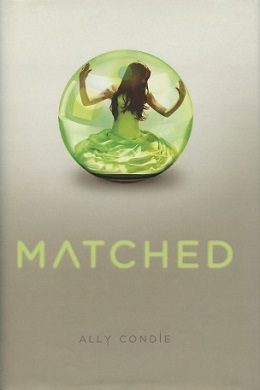I like the books. I really do. I'm finding myself more and more fascinated by dystopian books.
But the more I read, the more I find myself comparing it to another book series I read a little while back called Delirium by Lauren Oliver.
 (By the way, I only read the first two books of the Delirium trilogy, and I'm only about halfway through with Crossed, so this is just my current point of view. And in no way am I stating that any of this is accurate or anything, just so you know, since sometimes I forget things too)
(By the way, I only read the first two books of the Delirium trilogy, and I'm only about halfway through with Crossed, so this is just my current point of view. And in no way am I stating that any of this is accurate or anything, just so you know, since sometimes I forget things too)But on the left here is the cover of Matched, and on the right is the cover of Delirium, both the first books in their series.
Both of the stories are set around their society. Both are forceful, choosing out who you're to marry and have kids with and all that. In Delirium, the citizens are brainwashed by a surgical procedure that render them almost like zombies (I'm talking about the trance-like state, not the flesh-eating part) that obey their wills. In Matched, the citizens retain their minds, though their free will is very limited still because basically everything is monitored, and they have to carry around tablets with them that have different effects depending on the color (blue, green, and red)
Both societies set up who you're going to marry and have kids with when you grow up. Delirium chooses the matches by asking you questions and comparing them to others' answers, and there is some choice there, because if I remember correctly, you get a few choices of people you could be matched up with, and you could number them in the order of your choice. In Matched, the society does it all for you. Since everything is monitored, they can accurately make guesses about most of what you decide even before you do. There is no choice here, though you can opt to become a Single, which is someone who doesn't marry and can't have kids.
But there is a major difference in the societies. In Delirium, you're not allowed to express love. That's what the procedure does: erase the feeling of love, because they claim that love is the deadliest disease of all (which does have some truth in it, actually, but I don't think that people deserve to be brainwashed like that. After all, love can bring happiness, even if it does seem to often lead to unhappiness) So if you express love, you'd get into trouble. The boys and girls are kept apart until they're married (I think) and there's a huge punishment if you're caught with a person of the other gender, especially if they suspect that there's love involved. One But in Matched, it's not that bad. You're allowed to show love. Boys and girls do go to school together, and before their Matching Banquets they do sometimes have games where they'll kiss other people. But once they're Matched, usually they become focused on their Match and don't do that (though there is apparently a percent of the teens who have flings with other people who aren't their Match, or something like that)
In Delirium, the society mostly seems to be based on eliminating love, because to them, love causes a lot of conflicts. They believe that the world is better off without it. And yeah, control is also thrown in there, but still. In Matched, the society seems to be based on having things at maximum efficiency, as well as control. I think that the matching in Delirium is mostly so that there is an order to things, so that they don't end up with someone they completely hate, and the brainwashing to prevent any rebellions, while the matching in Matched is to get the best genes mixed together or something, and where they use the threats of getting an Aberration status and the tablets for control.
I know that they're not the same. I'm not saying they are, if that's what you're thinking. But I can't help but compare the two stories. And it's not just because of the societies. But I'll get to that in a different post. And there are probably other things I could compare between the two societies, but I think I'm fine with these for now.
And if you haven't read either of the series, I would recommend it if you like dystopian stories. I know that I like them.


No comments:
Post a Comment